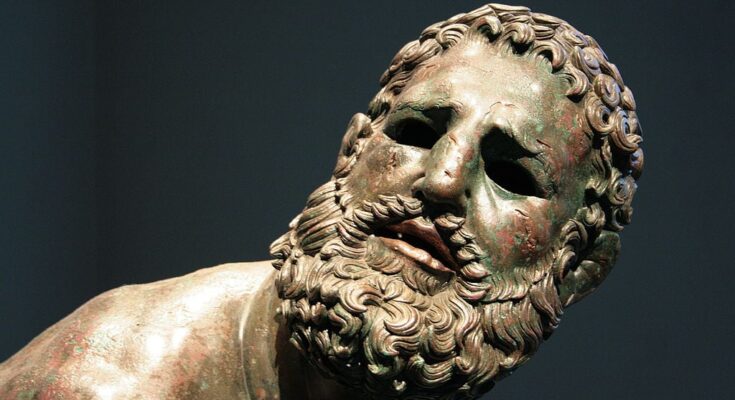Boxing, a popular sport in the ancient Greek Olympic Games, made its first modern appearance at the 1904 Summer Olympics as a men’s event. Since the 1908 Olympics, boxing has been contested at every Summer Olympic Games besides the 1912 Summer Olympics in Stockholm, because Swedish law banned the martial arts at the time.
Theagenes of Thasos was one of the towering sports figures from the ancient Olympic Games who supposedly won 1,400 bouts throughout a 22-year career.
His most significant achievements came at the Olympics in 480 and 476 BC, when he became the first athlete to win the wreath in boxing and pankration, a form of mixed martial arts that combined wrestling and boxing.
Theagenes’ versatility extended beyond the Olympics. He reportedly accumulated over 1,400 victories in various athletic competitions across Greece, including the Pythian, Isthmian, and Nemean Games, which were part of the Panhellenic circuit.
His dominance was not limited to combat sports. According to Pausanias, a Greek traveler and geographer, Theagenes also won numerous victories in running events, showcasing his exceptional versatility as an athlete.
He was born around 480 BC on the island of Thasos. According to legend, his remarkable strength was evident from a young age. One famous story tells of how, as a child, he carried a bronze statue of a god from the agora to his home, which amazed the townspeople.

Boxer Theagenes of Thasos was worshiped as a hero
Theagenes was so revered that after his death, he was venerated as a hero. The people of Thasos established a hero cult in his honor, and he was worshipped as a god.
His statue was believed to have healing powers, and sick people would sleep beside it in hopes of a cure. Numerous statues and commemorations of Theagenes were erected in various locations. One famous statue by the sculptor Glaucus of Aegina was placed in Olympia, celebrating his accomplishments.
Various myths and anecdotes about Theagenes further highlight his legendary status. For instance, it was said that he defeated an Olympic victor in boxing while suffering from a severe fever, demonstrating his unparalleled toughness and determination.
According to legend, when a vandal later attempted to deface a statue that had been erected in his honor, the giant bronze fell on the man and crushed him to death.
Theagenes’ legacy influenced generations of athletes who aspired to achieve similar greatness. His name became synonymous with athletic excellence and the pursuit of glory in ancient Greece.
Olympic athletes in ancient Greece and their legacy
Ancient Greek athletes left their mark on the original Olympic Games forever, with many of their accomplishments recorded by some of the greatest historians of the time.
The first written records of the ancient Olympic Games date back to 776 BC, when a cook named Coroebus, of Elis, won the only event in the competition -– a 192-meter (630-foot) footrace called the stade (the origin of the modern word “stadium”) — thereby becoming the very first Olympic champion of them all.
By the end of the 6th century BC, the Olympics had become the most famous of all Greek sporting festivals — and there were many such competitions in those times, including the Pythian Games, held at the religious center of Delphi.
But the Olympics, and all the ancient Greek athletes, held a special place of distinction in the Greek pantheon.
The ancient Olympics were held every four years between August 6 and September 19 during a religious festival dedicated to Zeus. The Games were named for their location at Olympia, a sacred site located near the western coast of the Peloponnese peninsula in southern Greece.
Related: Ancient Greek Athletes Who Defined the Olympic Games



